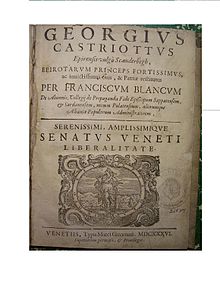Frang Bardhi
Frang Bardhi (lat. Franciscus Blancus , * 1606 in Kallmet e Zadrimës , Albania ; † 1643 ) was bishop of the Albanian diocese of Sapa and Sardis from 1636 until his death . He was the first to write a Latin-Albanian dictionary. Beyond his ecclesiastical work, Bardhi is therefore an important figure in Albanian cultural and linguistic history.
Life
Little is known about Bardhi's life. He came from a village in the fertile Zadrima plain not far from Lezha . He completed his theology studies at the Illyrian Seminary in Loreto near Ancona. In 1636 he was appointed bishop of Sapa and Sarda. In his relations to the Congregation De Propaganda Fide or the Roman Curia, Bardhi described that the Christians of his diocese were very oppressed by the Muslim masters. Bardhi thought little of foreign-language missionaries in the pastoral care, rather it was his goal to train enough Albanian candidates for priesthood. The missionaries from abroad should see their main task in the maintenance of schools, which prepared local youth for study. Bardhi's hopes in this regard were dashed for a variety of reasons: the Muslims hardly allowed the establishment of Catholic schools, he also lacked money and suitable teachers, after all he had too little time for his great goal, because he was only 37 years old the death.
plant
Frang Bardhi is best known for his Latin-Albanian dictionary, which he had printed in Rome in 1635. In the antique style of the time he called his Albanian mother tongue lingua epirotica (Epirotic language). Bardhi's work contains over 5600 Latin entries that have been translated with about 2500 different gic expressions. In the appendix it contains some lists with Albanian names of persons and places, short dialogues as application examples and over 100 Albanian proverbs. It was the first ever Albanian dictionary. Bishop Bardhi had intended the book primarily as a tool for young Albanian theologians who had to familiarize themselves with the Latin language for their profession. Today the Dictionarium Latino Epiroticum is one of the most important sources for the level of development of the Albanian language in the 17th century.
The second work passed down by Bardhi is the so-called Skanderbeg Apology. He was responding to a 1631 publication by the Bosnian cleric Tomko Marnavich, who had referred to Skanderbeg as a Slavic prince. In his reply, Bardhi explained the Albanian descent of the Prince of Kruja and expressed the hope that one day his compatriots would fight the Turks as successfully as they had done under Skanderbeg's leadership.
Bardhi's relations with the papal authorities in Rome are of cultural and historical interest. In it he not only described the political situation in Ottoman-ruled Albania, but also provides information about the economic situation and the way of life of the rural population. For the villages of his diocese he gives very precise information about the population and religious affiliation.
Fonts
- Dictionarium Latino Epiroticum. Cum nonnullis usitatioribus loquendi formulis . Rome 1635 ( reprint from 2004, PDF, 477 kB )
- Georgius Castriottus Epirensis vulgo Scanderbegh Epirotarum princeps fortissimus, ac inuictissimus Suis et patriae restitutus . Venice 1636 (now known as the Skanderbeg Apology)
- Descrittione et informatione del stato del vescouato et chiese parochiali della Diocese Sappatense . Injac Zamputi (ed.): Relacioni i Frang Bardhi mbi Zadrimën, drejtue Kongregacionit të Propagandës në Romë në shek. XVII . In: Buletini për Shkencat Shoqërore . Tirana, 2 (1956), pp. 163-192. ( English translation ).
literature
- Peter Bartl: Bardhi, Frang . In: Biographical Lexicon on the History of Southeast Europe . Volume 1. Munich 1974, p. 136
- Eqrem Cabej: Për gjenezën e literaturës shqipe . Shkodër 1939
- Robert Elsie: Albanian Literature. An Overview of its History and Development . In: Österreichische Osthefte , 17 (2003), special volume Albania, pp. 243–276. ( PDF; 203 kB )
- Zija Xholi: Pesë mendimtarët më të vjetër të Kulturës sonë kombëtare: M. Barleti, Gj. Buzuku, P. Budi, F. Bardhi, P. Bogdani . Tirana 2003. ISBN 99927-901-1-3
| personal data | |
|---|---|
| SURNAME | Bardhi, Frang |
| BRIEF DESCRIPTION | Bishop of the Albanian diocese of Sapa and Sardis |
| DATE OF BIRTH | 1606 |
| PLACE OF BIRTH | Kallmet të Zadrimës |
| DATE OF DEATH | 1643 |

